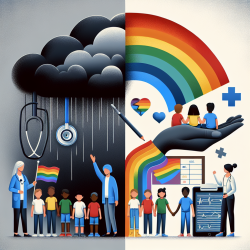Understanding the Impact of Conversion Therapy on LGBTQI2+ Youth
The recent study titled "Sexual orientation and gender identity and expression conversion exposure and their correlates among LGBTQI2+ persons in Québec, Canada" sheds light on the prevalence and impact of conversion therapy efforts on LGBTQI2+ individuals. The findings are not only alarming but also serve as a crucial call to action for practitioners who work with children and adolescents.
Key Findings from the Study
According to the research, a significant number of LGBTQI2+ individuals in Quebec have been exposed to conversion attempts, with a quarter of respondents reporting such experiences. The study highlights the following key points:
- Conversion attempts are often initiated by family members, emphasizing the need for family-centered interventions.
- Indigenous, intersex, transgender, non-binary, and asexual persons, as well as people of color and individuals with non-monosexual orientations, are more likely to experience conversion attempts.
- Health professionals, particularly those in religious settings, need to be aware of the ethical implications and potential harm of conversion practices.
Implications for Practitioners
For practitioners, these findings underscore the importance of adopting LGBTQI2+ affirmative approaches in therapy and counseling. Here are some steps that can be taken:
- Education and Training: Practitioners should seek ongoing education on LGBTQI2+ issues and ensure their practice is inclusive and supportive.
- Family Counseling: Given the role of family in conversion attempts, practitioners should work with families to foster acceptance and understanding of sexual and gender diversity.
- Collaboration with Religious Leaders: For those in religious contexts, collaboration with religious leaders to align spiritual guidance with ethical therapy practices is crucial.
Encouraging Further Research
While this study provides valuable insights, there is a need for further research to explore the long-term effects of conversion therapy and effective intervention strategies. Practitioners are encouraged to engage in or support research initiatives that aim to improve the well-being of LGBTQI2+ individuals.
To read the original research paper, please follow this link: Sexual orientation and gender identity and expression conversion exposure and their correlates among LGBTQI2+ persons in Québec, Canada.










